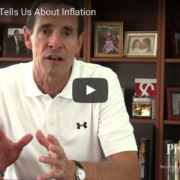Improving Investor Behavior – A Good Dose of Vitamin A
The start of the year brings a renewed interest in finance for many people. It’s only natural: fresh starts, new beginnings, and helpful habits all come together to create a positive outlook on a clean slate. May I also recommend taking a megadose of what I call Vitamin A(ttitude)? Human nature has a tough time storing this vital mineral, and I think we all need a regular dose every day.
Our attitude defines our behavior, and this time of year is a great chance to look candidly at your attitudes, assumptions, and beliefs. Last year was impressive from a market perspective, but pales in comparison to what really matters: your own personal progress.
We believe the best approach for financial success starts with being goal-focused and plan-driven, which is distinctly different from the norm of focusing on market wiggles and current events. Our belief stems from two principles:
- Long-term investment success comes from continually acting on your financial plan, and
- Investment failure comes from continually reacting to recent events in the economy, the market, and the world.
A long-term approach is evaluated by the progress you make toward your goal. It’s that simple. If your goal is true north, then any progress made toward it is what counts, regardless of all the noise along the way. The wiggles and talking heads all serve as distractions, encouraging you to fall off your path and start down another. This is the siren sound of forecasting, and it is a fool’s errand.
Consider a question about forecasting that we’ve heard a lot lately: “Is now a good time to invest?”
The answer? Yes.
Last year was an amazing one. In many ways, it was a mirror of 2018, which I find interesting. If you’ll recall, things were looking rather rosy in 2018: the economy, corporate earnings, and dividends were on the up-and-up. How did we finish 2018? With the S&P down about 4.75 percent, including dividends. September to Christmas alone saw a decline of almost 20 percent.
The first four months of 2019 were robust, making up all of the declines in Q4 2018. Then the market corrected in late spring followed by new high values in June and July, then a consolidation in the fall. The fourth quarter saw a market-wide “melt-up.” Yet this was all on the back of pessimistic news and widespread fears, including trade wars, declining corporate earnings, and a constitutional crisis. The S&P finished the year with an increase of more than 33 percent, including dividends.
As you can see, forecasting does not work. Reacting to news and current events doesn’t either.
We don’t know what 2020 will bring. We don’t forecast, and those who do are just guessing. The reality is the only way to capture the investment returns of great companies is to ride out the temporary declines that have historically lead to permanent advances. We prefer to be paid along the way, favoring growing dividend companies rather than speculating on price appreciation alone.
The performance of a portfolio becomes nearly irrelevant if you are making progress toward your goals, both financially and personally. That’s the only benchmark that matters. Risk is not a measure of short-term price declines; risk is measuring the probability you won’t achieve your goals. Your financial plan should have the sole goal of minimizing that risk.
Your attitude will define your behavior, and your behavior will define your success. Consider this: amid the most extended period of economic growth, over ten years, some 128 consecutive months of positive economic growth, investors were net liquidators of equity mutual funds and exchange-traded funds (ETFs).
As values have increased, investors have been moving money out of equities and “investing” it in fixed income and bonds. Mind you, bonds lose purchasing power to the most destructive force investors face in their lifetime: inflation. When you buy a bond, the interest payment you receive will never increase. Worse yet, when you buy a bond fund or bond ETF, and interest rates rise (which they likely will eventually), the price of that asset could fall like a stone.
A fearful attitude is driving the investment decision for many investors. And who knows, they might be right. But if they are wrong, they will be backpedaling, losing purchasing power, and precious time. We’ve seen this time and again over the last ten years. All the while, investors were asking, “Is now a good time to invest?” The same question results in the same answer: yes.
Statistically speaking, 2020 likely will not match the performance returns of this past year – few years do. But I argue that it doesn’t really matter. Instead, it’s your progress that matters. Those who were goal-focused and plan-driven had an exceptional year in 2019. Some of this can be attributed to the return of the market; much of it cannot. We believe that a positive attitude and good investor behavior will continue to reward investors in the coming decades. Patiently investing with a long-term investment discipline is the lesson from 2019, and the lesson history continues to teach us.
Steve Booren is the Owner and Founder of Prosperion Financial Advisors, located in Greenwood Village, Colo. He is the author of Blind Spots: The Mental Mistakes Investors Make and Intelligent Investing: Your Guide to a Growing Retirement Income and a regular columnist in The Denver Post. He was recently named a Barron’s Top Financial Advisor and recognized as a Forbes Top Wealth Advisor in Colorado.








